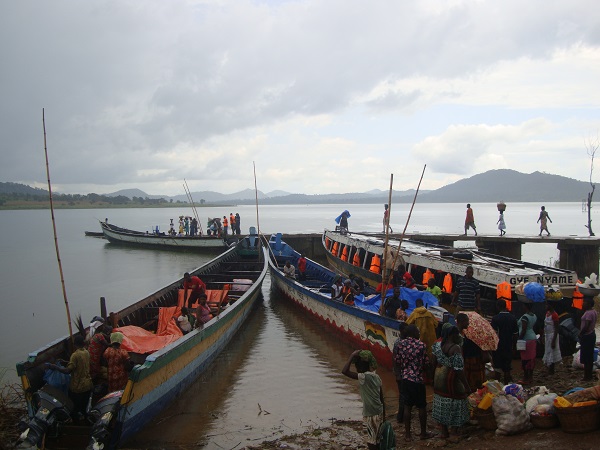
Beautiful Kpando
Key among what makes the Volta Region tick is a long list of towns with natural and cultural beauty plus an intriguing history behind their stories.
One such town is Kpando, a tourist destination which is enhanced by a mix of factors including its historical links with German occupation.
Advertisement
Kpando’s nerve centre is at Tokor. The place shows a bustling business activity. If you visit you would be amazed. Seeing scores of boats on the Volta Lake surrounded by a chain of hills makes for a pleasant landscape view.
Because the Lake dredges through the area the vegetation is lush and ever green. But before we get carried away with the natural beauty let us dwell a bit on Kpando history.
You know that famous story of how the British got tired of Nana Prempeh, the Asantehene and sent him to Seychelles in exile? Well, something similar happened here too. While the Germans were in charge, the King of Kpando was Dagadu Anku III. This man was the kind who wouldn’t take subjugation lying down. He became a bit too critical of the colonial policies of Germany.
Finding him too hot to handle, the Germans bundled up King Dagadu and sent him to a little nice ‘’holiday’’ in Cameroun (Kamalo, as the natives call it). This happened on March 13, 1914. The banishment didn’t really end badly as the King was brought home the following year. He carried the enviable title “Okpekpewuokpe” (now you know why the white men were scared).
The freeing and return of “Okpekpewuokpe” was also quite eventful. He was freed on September 27, 1914 by British forces that defeated the German army in Cameroon during World War 1. (Here, I ask myself: how much of this do the schoolchildren of Ghana know?)
As a tourism destination, Kpando is blessed with a cluster of attractions and events which are essentially undeveloped. Key among them is the slave trade heritage. The Eastern corridor caravan route passed through Kete-Krachi from Salaga. From Kpando, slaves were shipped in boats to river ports such as Akuse and Ada Foah in the south. Vakpo, which is nearby has a Slave Cave attesting to the event.
For the information of the very religious, Kpando holds one of the oldest catholic cathedrals. Add a chain of prayer camps and the biggest catholic grotto in Ghana at Agbenorxoe. These serve as a major tourist destination for pilgrims from all over West Africa. During Easter celebrations, people travel to observe the ‘crucifixion’ and the ‘resurrection’ of Christ at the grotto.
The mention of Easter brings to mind how big this can be in the area. I don’t know if it is the mountain effect, but when they are up to it, the people of Kpando give Easter the pomp and circumstance that can only be matched by the Kwahus. The event here becomes a jamboree with a large number of natives arriving home to join the celebration.
Several natural attractions provide potential for tourism development. Apart from Kpando Torkor there are lakes and islands at Kpeve Tornu, Dzemeni (note how this sounds like Germany), Wusuta and Awate Tornu in addition to an estuary of the Dayi River.
I am excited at the possibility of developing a resort with beach and sports activities. The natural port and a peninsular (Melili) should make this interesting. Boat cruises, holiday camps and beach picnics are all realities that need to be worked at.
If you love wildlife then you might like to visit Awate Todzi, a crocodile cave in the valley down from Todzi to Agame. The place is called Dzongeme and the cave is under the custody of a fetish priest. For those looking to book an appointment, the crocodiles make appearance to visitors only on Thursdays.
Within this same area are two mystical mountains which were believed to provide defence for the people in time of wars.
These mountains are the Awawortoe which serve as a hideout for women and other minors during wars and mountain Akpotoe. The latter is believed to harbour swarm of bees which act as combatants on battlefield.
If you think I am going to end this without talking about Borborbor, you are dead wrong. This exciting dance is not only infectious but easy to do (Ask KSM of TGIF fame). Indeed all one needs to do is surrender to the irresistible accompanying beat by joining other dancers. With handkerchiefs (two mandatory) on the ready, one waves and bends along.
Interestingly enough the bending stage is announced with that pleasant sounding of the bugle.
Borborbor is actually a modern dance with exponents such as Francis Nuatro, an illustrious native, developing. It became famous around the same time as Ghana’s independence. No wonder Kwame Nkrumah loved dancing to Borborbor. And no wonder he loved waving his handkerchief as well.
It’s simply a lovely dance and anytime you visit Kpando, allow yourself the opportunity to do the dance. The music will remain in your ears for a long time.
My favourite Borborbor song is a popular one called ‘Lorlor vava de le nye me.’’ (There’s a special love in my heart for you). If you ever hear that, remember me in your happiness.



